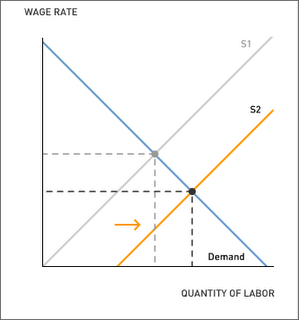Same Problem, Different Solutions
by Victoria MiuRecently, both U.S. and British farmers have faced the problem of a labor shortage. How can a labor shortage occur when the unemployment rates of both countries have remained positive? Effectively, a labor shortage is the same as any other type of economic shortage—it occurs whenever the price (in this case, the wage) is lower than the equilibrium price, leading to a situation where the quantity of labor demanded exceeds the quantity of labor supplied. Since labor is one of the main factor costs in the agricultural industry, farmers in both countries are reluctant to raise the wages of their workers, as this would raise costs and reduce profits.
The wages of farm workers in Britain and the U.S. have been kept low by the influx of immigrant farm workers. Immigration increases the labor supply in the host country, shifting the labor supply curve to the right. As a result, the equilibrium wage for farm workers in the host country falls.
 So what are the sources of the farm labor shortages in the U.S. and Britain?
So what are the sources of the farm labor shortages in the U.S. and Britain?
According to the Department of Labor, more than half of the 2.5 million farm workers in the U.S. are illegal immigrants. The recent crackdown on employers of illegal immigrants poses a threat to many U.S. farmers who rely on immigrant workers. With a tighter immigration policy, the U.S. farmers would have to rely on domestic instead of immigrant workers. As the labor supply decreases with fewer immigrants (the supply curve shifts to the left), the farmers have to pay a higher wage. If they are reluctant to raise the wage, they will face a shortage of willing workers at the initial wage.
Britain did not tighten its immigration policy against Europeans. Nevertheless, the number of Europeans going to Britain for farm work has decreased due to better job opportunities in booming European economies. At the same time, many European workers are beginning to find other types of British jobs preferable to agricultural work. As fewer immigrant workers make the trek to Britain, and those that do choose non-agricultural jobs, the supply of farm workers in Britain declines. In Britain, as in the United States, reluctance to offer higher wages leads to a shortage of willing workers. Only when British and American farmers offer higher wages will the labor shortages disappear.
Interestingly, the farmers in these two countries have adopted completely different approaches to dealing with the problem. While some U.S. farmers chose to avoid the immigration issue by offshoring their operations to Mexico, the British farmers lobbied the government to bring in more Ukrainian workers under a special scheme. How well do these two approaches address the agricultural labor problem in the two countries?
Discussion Questions
1. As observed by Julia Preston of the International Herald Tribune, what impact does the offshoring of farm operations have on the U.S. economy as a whole?
2. According to the Economist, what is the best way to provide incentives for immigrant workers to work hard? Why?
The wages of farm workers in Britain and the U.S. have been kept low by the influx of immigrant farm workers. Immigration increases the labor supply in the host country, shifting the labor supply curve to the right. As a result, the equilibrium wage for farm workers in the host country falls.
 So what are the sources of the farm labor shortages in the U.S. and Britain?
So what are the sources of the farm labor shortages in the U.S. and Britain?According to the Department of Labor, more than half of the 2.5 million farm workers in the U.S. are illegal immigrants. The recent crackdown on employers of illegal immigrants poses a threat to many U.S. farmers who rely on immigrant workers. With a tighter immigration policy, the U.S. farmers would have to rely on domestic instead of immigrant workers. As the labor supply decreases with fewer immigrants (the supply curve shifts to the left), the farmers have to pay a higher wage. If they are reluctant to raise the wage, they will face a shortage of willing workers at the initial wage.
Britain did not tighten its immigration policy against Europeans. Nevertheless, the number of Europeans going to Britain for farm work has decreased due to better job opportunities in booming European economies. At the same time, many European workers are beginning to find other types of British jobs preferable to agricultural work. As fewer immigrant workers make the trek to Britain, and those that do choose non-agricultural jobs, the supply of farm workers in Britain declines. In Britain, as in the United States, reluctance to offer higher wages leads to a shortage of willing workers. Only when British and American farmers offer higher wages will the labor shortages disappear.
Interestingly, the farmers in these two countries have adopted completely different approaches to dealing with the problem. While some U.S. farmers chose to avoid the immigration issue by offshoring their operations to Mexico, the British farmers lobbied the government to bring in more Ukrainian workers under a special scheme. How well do these two approaches address the agricultural labor problem in the two countries?
Discussion Questions
1. As observed by Julia Preston of the International Herald Tribune, what impact does the offshoring of farm operations have on the U.S. economy as a whole?
2. According to the Economist, what is the best way to provide incentives for immigrant workers to work hard? Why?
Labels: Labor, Supply and Demand



0 Comments:
Post a Comment
<< Home